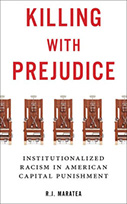Killing With Prejudice: Institutionalized Racism In American Capital Punishment

Author: R.J. Maratea
Publisher: New York: New York University Press, 2019. 233p.
Reviewer: Margaret Vandiver | May 2021
Since 1976, almost 1,500 prisoners have been executed in the United States. Nearly all of them were obscure; their cases moved through the appeals process without creating legal precedent or great public interest. But in the past few years, at least three books, including Maratea’s, have focused on the case of one of those 1,500, Warren McCleskey, who was put to death in Georgia in 1991. This interest is justified: McCleskey’s case resulted in two important United States Supreme Court decisions that continue to affect the administration of the death penalty nearly three decades after his execution.
Maratea traces McCleskey’s case from the killing of Officer Frank Schlatt in 1978 through his appeals and execution, with primary focus on the first Supreme Court decision, McCleskey v. Kemp (1987). In this 5-4 opinion, frequently compared to Dred Scott and Plessy, the Supreme Court essentially ruled that “a racially disproportionate capital system is not unconstitutional” (p. 102). Maratea grounds his account of the case in the history of law and race, particularly in Georgia. He argues, as did McCleskey’s attorney, that the “old habits of mind, the racial attitudes” of the past continue to influence current practice (p. 5). Maratea describes the study by David Baldus that documented significant racial disparities in Georgia’s death penalty system and its reception by the federal courts. He provides insight into the Supreme Court’s decision with thorough descriptions of the arguments presented by lawyers on both sides and the reasoning of the justices.
It is worth reflecting on how close McCleskey’s team came to success. They were within one vote of achieving effective abolition (and Lewis Powell, who wrote the opinion, later told his biographer it was a vote he would change if he could). A victory for McCleskey would have brought most if not all executions in the U.S. to a halt and would have demonstrated a commitment to real justice on the part of the Supreme Court, with deep implications for the criminal justice system and for American life more broadly. Maratea aptly characterizes McCleskey’s second Supreme Court case, McCleskey v. Zant, as “greasing the wheels and hastening death” (p. 108). This decision restricted capital appellants’ right to obtain relief and their ability to raise issues in federal court, especially on successor habeas petitions. Taken together, McCleskey v. Kemp and McCleskey v. Zant demonstrated the Supreme Court’s refusal to honor its stated commitment to fairness in capital sentencing. By approving a system that operated with significant racial disparities and by restricting appellants’ ability to receive hearings in federal court, the Supreme Court cleared the way for the surge in executions that occurred in the years following McCleskey’s decisions.
Maratea’s book arrives at a highly relevant time, as hate crimes are rising, open expressions of racial prejudice are once again common, and the Supreme Court has recently shown a renewed appetite for executions. In his analysis of the racial dynamics of Reconstruction, Jim Crow, and modern structural racism, Maratea offers compelling evidence of what Justice William Brennan, in his dissent to McCleskey v. Kemp, called “the grip of a historical legacy spanning centuries…. the subtle and persistent influence of the past.” The Court’s retreat both from substantive justice and from procedural fairness in McCleskey’s two decisions not only revealed the malign influence of the past, but also extended it into the future.
References
Keys, D.P. and R.J. Maratea, eds. 2016. Race and the Death Penalty: The Legacy of “McCleskey v. Kemp.”Boulder, CO: Lynne Rienner.
Kirchmeier, J. L. (2015). Imprisoned by the Past: Warren McCleskey and the American Death Penalty. Oxford: Oxford University Press.
McCleskey v. Kemp, 481 U.S. 279 (1987). McCleskey v. Zant, 499 U.S. 467 (1991).
Margaret Vandiver, Professor Emerita, Department of Criminology and Criminal Justice, University of Memphis


